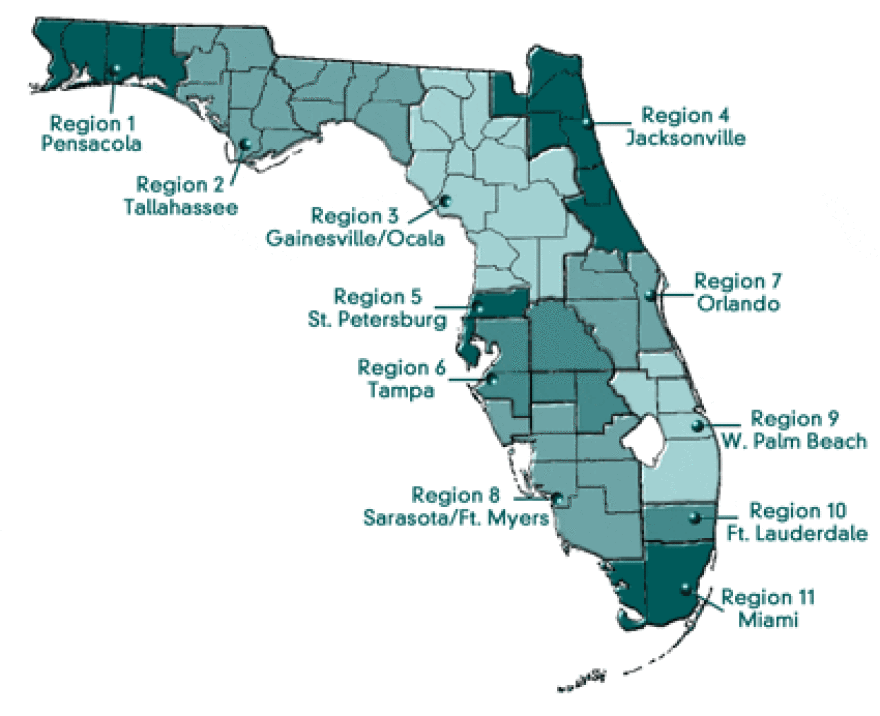This week the federal government signed off on the first part of a plan steering three million low-income Floridians on Medicaid into a managed care or HMO system. The decision comes two years after state lawmakers approved the conversion in an attempt to control costs in the $22 billion program. When the measure was first approved, many people were skeptical about how it would work.
“For-profit companies have a fiduciary responsibility to do what? Make money. So they’re not going to manage their care, they’re going to ration their care,” said Joseph Flynn, a retiree living in the Central Florida community of the Villages, where Governor Rick Scott was holding his first budget signing ceremony at the time.
That skepticism has not gone away and now that the federal Centers for Medicaid and Medicare Services have signed off on part of a waiver allowing Florida to begin its transition to Medicaid managed care with Medicaid recipients in long-term care, there are more questions than there are answers.
Under the state’s current fee-for-service model, the patient goes to a provider: a nursing home, hospital or doctor. Those providers bill the state, and the state cuts a check. But the problem is, there are multiple checks, no better health results and it’s too expensive. Managed Care seeks to change all that.
“Let’s just take medication compliance. That alone. That’s a big issue for seniors, people in long-term care, because that can be very complicated,” said Michael Garner, President of the Florida Association of Health Plans. He says managed care has number of ways to help boost health outcomes, starting with something as simple as helping people manage their medications:
“Managed care plans have a number of techniques, everything from having a nurse come out and do pill counts. So just on pharmaceutical management, we can do a tremendous thing to improve the continuity of health for that individual and lower cost.”
In the new Medicaid managed care model, Florida will be handing over billions of dollars to select health plans in various regions of the state to treat Medicaid patients in nursing homes. The health plans will build provider networks and contract with them. Patients will be able to choose their plan and network. But Elder Law Attorney Twyla Sketchley says the state already has problems with Medicaid recipients, especially those in rural communities, getting access to doctors, and “we don’t know how, If we can’t get it for private pay rates, how the managed care organizations will be able to provide it for probably less than what the private pay rates are going to be.”
But the health plan association’s Garner says the state’s managed care plan holds insurers accountable for making sure enough healthcare providers are available in their network. He also says while Medicaid reimbursements have always been low, the savings companies gain by having better health outcomes for their patients will be steered into raising reimbursements rates within the plans.
Medicaid recipients in long-term care, mostly seniors, will be the first to go into managed care. The plan is to try to steer some of those people out of nursing homes and into home and community-based programs, which are cheaper. But the Florida Healthcare Association, which represents the long-term care industry, wonders how the savings the state wants will be achieved.
“In fact, there was a study done on Florida, and only about one-percent of patients in nursing homes were found to be inappropriately placed,” said the Association’s Executive Director Emmitt Reed.
He says it’s not unreasonable for companies to turn a profit—most have to in order to stay in business, but, “nursing homes operate on razor-thin margins already. Out of the entire medical profession, it’s the least profitable. We’re just curious to see how a company would be able to come in and significantly slash costs without affecting quality.”
Reed says it’s a situation his group is watching closely. Medicaid managed care is not a new concept. Florida has had a pilot project in five South Florida counties since 2006, with mixed results on care and cost. While the state has gotten approval from the federal government to begin enrolling seniors and disabled people, it’s still awaiting approval to move the larger Medicaid population into managed care.
* This report was produced as part of "Health Care in the States," a special project of WFSU, NPR and Kaiser Health News.
--
For more news updates, follow Lynn Hatter on twitter @HatterLynn


